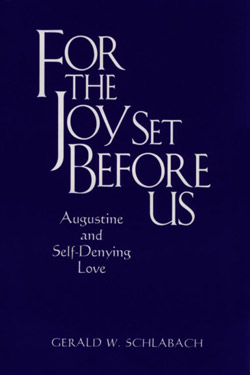 Age-old debates over self-love and self-denial continue in the Christian community. Many regard self-love as incompatible with the self-sacrifice of Christ. Others, especially feminists and liberation theologians, contest the notion that self-sacrifice is the test of authentic Christian love. The resolution to this dilemma, argues Gerald Schlabach, lies with St. Augustine.
Age-old debates over self-love and self-denial continue in the Christian community. Many regard self-love as incompatible with the self-sacrifice of Christ. Others, especially feminists and liberation theologians, contest the notion that self-sacrifice is the test of authentic Christian love. The resolution to this dilemma, argues Gerald Schlabach, lies with St. Augustine.
In this engaging book, Schlabach examines how Augustine reconciled self-love and self-denial in a unified Christian love. He demonstrates the crucial role that continence played in Augustine’s teaching. It is much more than an attitude toward sexuality. Rather, it is the operative mode of Augustinian caritas.
Addressing historical theology, contemporary Christian ethics, feminism, and pastoral considerations, Schlabach traces the role that self-denial played in Augustine’s teaching. He argues that an integration of self-love and self-denial enables us to distinguish true Christian selfdenial from mere victimization and that the good we seek when we love — whether directed toward neighbor, enemy, or self — is not self-serving but rather a participation in a mutual relationship with God and His creation.
Through this critical retrieval of Augustine’s thought, Schlabach shows that self-denial is meaningful only when ordered to a higher good, as when Christ endured the suffering of the cross. He demonstrates practical applications of how charity working through continence can maintain right selflove and proper self-denial in our daily lives, and proposes that Christian self-sacrifice is the willing acceptance of a good derived from working on behalf of others.
Schlabach rediscovers a unity of Christian love and opens up new resources even for readers skeptical of St. Augustine. His work offers provocative reading for all who are concerned with keeping their lives and work rooted in the Christian tradition of love and service.